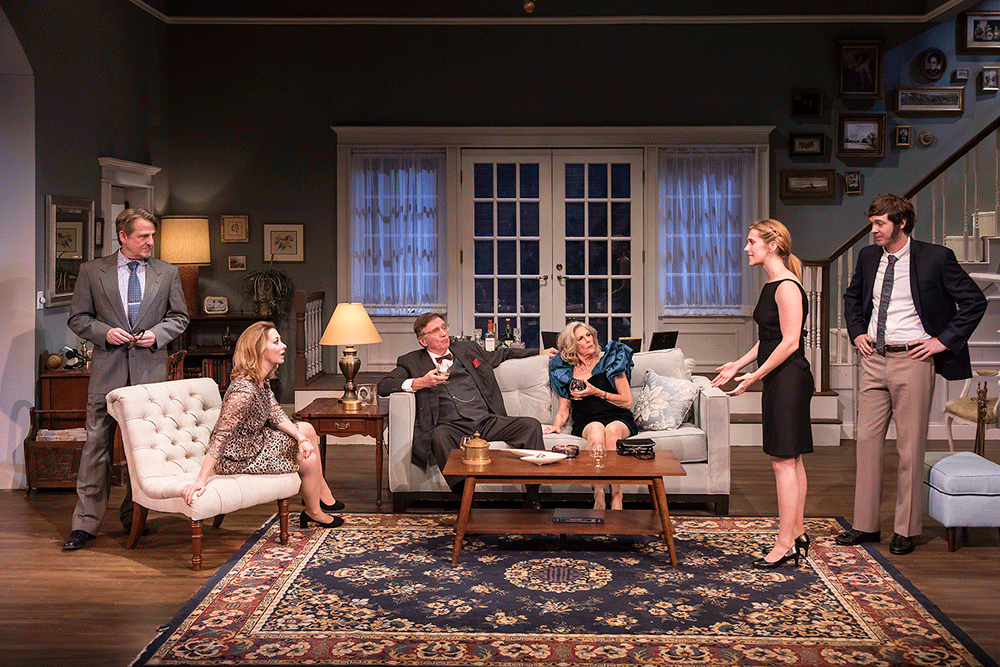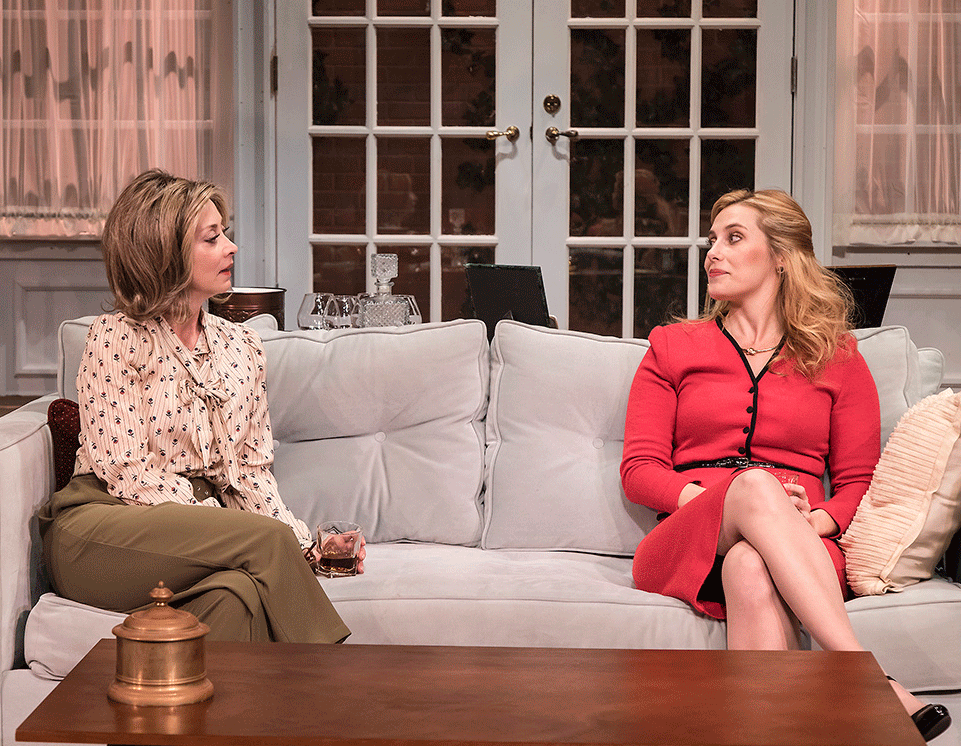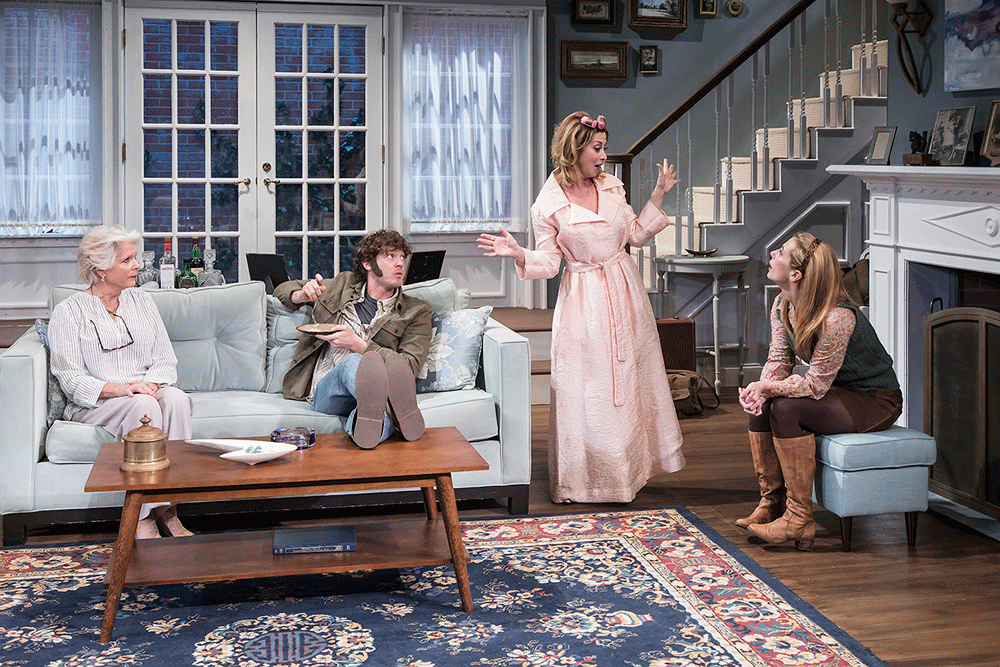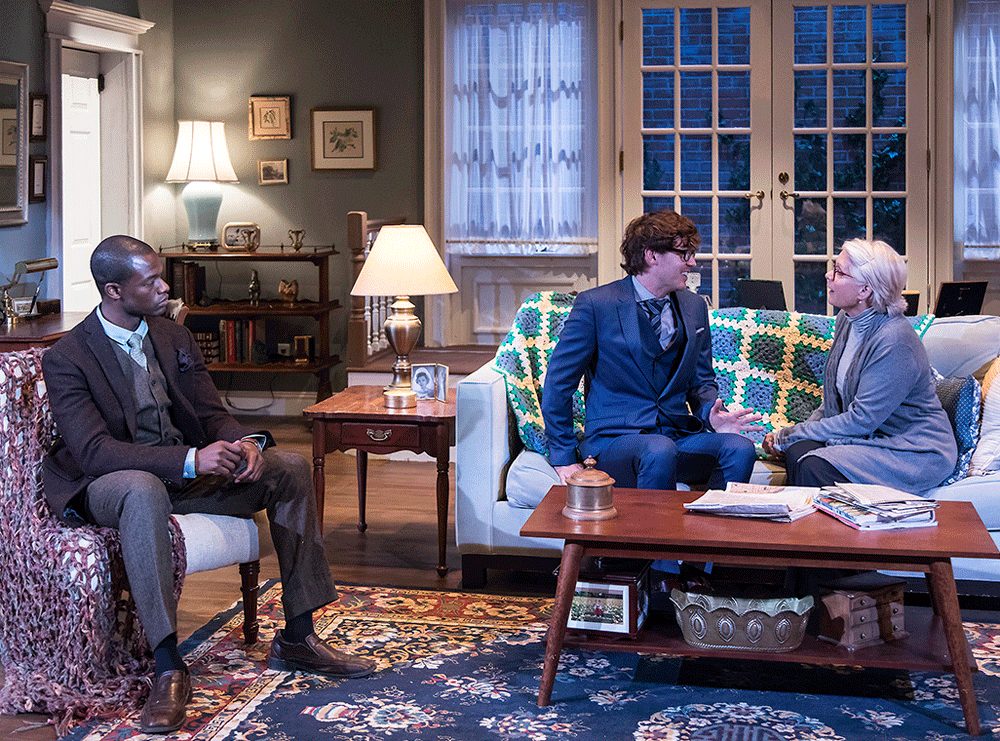9 minutes reading time
(1842 words)
Review: ETC’s The City of Conversation

Theatre
Review
Wrongs of the Righteous
Anthony Giardina’s timely play, The City of Conversation, now playing at Santa Barbara’s ETC, traces the story of a fictional Washington D.C. political doyen, Hester Ferris, pushing American politics Pamela Harriman-style, behind the scenes in her dining and drawing rooms, across four decades and many more presidential regimes. It is in many ways a difficult play to pull off, in spite of its many funny lines, and pertinent content.
This ETC production fairs better than most, in large part thanks to Sharon Lawrence’s superb rendering of Hester Ferris, its lead character. In a sense, the main reason to watch this play is to see Lawrence work her magic.

Setting the stage for internecine warfare.
Bjorn Johnson, Sharon Lawrence, Richard Hoag, Kathy Marden, Sally Hughes and Matthew Grondin in the ENSEMBLE THEATRE COMPANY production of "THE CITY OF CONVERSATION"
Bjorn Johnson, Sharon Lawrence, Richard Hoag, Kathy Marden, Sally Hughes and Matthew Grondin in the ENSEMBLE THEATRE COMPANY production of "THE CITY OF CONVERSATION"
PHOTO CREDIT: David Bazemore
Theatre
Review
Wrongs of the Righteous
ETC’s The City of Conversation
Anthony Giardina’s timely play, The City of Conversation, now playing at Santa Barbara’s ETC, traces the story of a fictional Washington D.C. political doyen, Hester Ferris, pushing American politics Pamela Harriman-style, behind the scenes in her dining and drawing rooms, across four decades and many more presidential regimes. It is in many ways a difficult play to pull off, in spite of its many funny lines, and pertinent content.
This ETC production fairs better than most, in large part thanks to Sharon Lawrence’s superb rendering of Hester Ferris, its lead character. In a sense, the main reason to watch this play is to see Lawrence work her magic.
Lawrence is ably supported by another well-known actress, Meredith Baxter, playing Hester’s sister and girl-Friday. Baxter’s part is surprisingly spare, but played with appreciable nuance. Ferris, in appropriate D.C. fashion is having an affair with an influential liberal senator, Chandler Harris, ably played by Bjorn Johnson.
Another highlight in the acting, again in a rather minor, but juicy, part, is Rich Hoag’s convincingly rendered George Mallonee, a conservative senator from Kentucky Hester has invited over for dinner in a plot to set up Kennedy’s ascent toward a presidential run against Carter. Hoag infuses his senator with a much needed warmth and congeniality. For those in the regional art scene, Hoag is indeed the husband of that other Hoag: Ruth Ellen Hoag, a long-time Santa Barbara artist. Senator Mallonee’s wife is played by veteran actress Kathy Marden, making her Ensemble debut.

Unsheathing the claws.
Sharon Lawrence and Sally Hughes star in the ENSEMBLE THEATRE COMPANY production of
Sharon Lawrence and Sally Hughes star in the ENSEMBLE THEATRE COMPANY production of
"THE CITY OF CONVERSATION"
PHOTO CREDIT: David Bazemore
Hester’s son, Colin Ferris, played by Matthew Grondin, unexpectedly shows up before the dinner with his fiancee, Anna Fitzgerald, a faux-naif played by Sally Hughes, to whom he explains, “Dinner, you have to understand, is always about something.”
Anna, it turns out, needs little explaining from Colin about anything. Hester quickly sizes up Anna’s game, warns her son that Anna will eat him alive, and to never, under any circumstances, marry her. Of course Colin heeds none of this. Kennedy doesn’t end up president either.
Thus we are introduced to Giardina’s special hell of power lust, partisan politics, and familial internecine warfare from which the Ferris family, and our country for that matter, fails to escape.
Structurally, the play is a classic melodrama in three acts [but not labeled as such], set in 1979, 1987, and 2009 respectively. Each act is centered around a critical juncture in the struggles of classic American Liberalism against coalescing forces on the right. Hester’s son and soon-to-be daughter in law turn out to be allied to those forces on the right; Hester sees herself as a champion for what is right, which is, in Hester and Giardina’s mind, classic New England Liberalism.
A highlight of this production is the superb lighting design thanks to Jared Sayeg, and a very much needed sound design by Avery Wheeler. The set, which in this play is almost a character in its own right, seems taken straight from the set of the Off-Broadway New York premier, but somehow seems to have missed the distinction between the top-line Georgetown townhouse of a powerful woman of great distinction with impeccable taste and the taste-blind suburban delusions of Chevy Chase wannabees. Its descent in the last act into frumpiness defies all psychological logic and sensibility: women of great taste do not tend to frumpiness as they age: they usually get more refined and neater. After all, by that time they are rid of their negligent husbands, children, and grandchildren and all their mess, while possessing ample means to pay someone else to do all the housekeeping to their exact specifications.

Preamble to the Poverty of Nations.
Meredith Baxter, Matthew Grondin, Sharon Lawrence and Sally Hughes star in the ENSEMBLE
Meredith Baxter, Matthew Grondin, Sharon Lawrence and Sally Hughes star in the ENSEMBLE
THEATRE COMPANY production of "THE CITY OF CONVERSATION"
PHOTO CREDIT: David Bazemore
As for the acting, one must always take into account opening night nerves; Johnson definitely gets rolling more in the last act with some fine work. Grondin eventually settles down, essentially redeeming himself in the last act as well, in his second incarnation, playing Ethan Ferris, Colin’s son and Hester’s grandson, which is well-differentiated from his portrayal of Colin in the first two acts. Otherwise there are almost painful-to-watch shenanigans in the first two acts. Grondin is all over the place. Hughes’ Anna is way too shrill and would play much better with more self-assured, claws-out, demonic darkness. Marden’s rendering is a short study in lost opportunity. Thankfully, Timothy Brown’s Donald Logan brings some fine, solid work into the last act, but too late. There is no sense of ensemble interaction throughout. Timing is frequently off.
Normally such goings-ons point to the director, but this ETC production is directed by a first-rate, well-traveled and capable director, Cameron Watson, of Rogue Machine and other top-flight contemporary houses. So what is going on here?
A big part of the problem with this play is the script.
First of all, Giardina tends to write diatribe rather than dialogue. That always makes ensemble work difficult. He gives us not characters with inner human motivations, but stand-ins for entire political constituencies, with capital-letter roles such as The Senator From Kentucky, not people, but stereotypes driven by purely ideological forces.
Of course this is part of Giardina’s point: that this is precisely what is wrong with our nation at this time, that there is a heavy price people and a nation can pay for rigid ideology. It sucks the humanity out of everything. However, it is more than ironic that Giardina’s script itself should suffer the same fate and fall victim to its politics.
Giardina’s script is also flawed in ways that are difficult for a director or actor, no matter how skilled they are, to overcome, or in ways that can blindside a lesser talent. There are problems with its mechanics, how it gets things done.
For example, the play fails miserably when it tries to get cute; and it tries to get cute in a number of places.
Structurally, the second act is a mess. It drags, it goes off into things that are inconsequential to its central purpose.
Huge difficulties are introduced by bringing a child part into the proceedings. The whole plot point around the manipulations of young Ethan Ferris could be handled with a few lines of deft dialogue without ever bringing the extra character onstage. Instead we are subjected to an extra half-hour of silliness, moving people back and forth, in and out, figuring out who and where to play ball, introducing patronizing cuteness, a boring and clumsy set-up for the discovery of a single letter. The whole section is unnecessary, unwieldy, ultimately irrelevant. It completely destroys the momentum of the story. In the end, all sense of ensemble confrontation between the adults has been lost.

Redemption and Dignity.
Timothy P. Brown, Matthew Grondin and Meredith Baxter star in the ENSEMBLE THEATRE
Timothy P. Brown, Matthew Grondin and Meredith Baxter star in the ENSEMBLE THEATRE
COMPANY production of "THE CITY OF CONVERSATION"
PHOTO CREDIT: David Bazemore
Even the idea that the major plot point should be a conflict hatched in the second half of the play--after a first act heading in a completely different direction-- is a questionable move. I’m all for multi-dimensional scripts, but at a certain point, especially more than halfway through, a playwright has to cut the crap and get to the point.
Part of Giardina’s trouble is that he seems to want to produce a masterpiece about the psychology of power, a sort of practicum on Nietzsche’s concept of the will to power, but lacks the dramatic scaffolding to pull it off. Giardina has the powers to do it. When Giardina is good, he is very good: intelligent, witty, literate, historically astute. He might even be able to pull it off with this script with a radical rewrite, or maybe no rewriting and a ruthless edit. It would help if Giardina stopped writing speeches and wrote more real dialogue.
A great director and great acting can only go so far in making up for such flaws. As it is, what is left to keep the audience going is the plot arc around Hester Ferris sustained by Sharon Lawrence’s superlative acting. Time and time again Lawrence rescues a scene or an exchange or even a small moment with deft body movement, a perfect gesture, or nuanced tone that re-introduces some sense of human feeling back into the polemics.
Such unsympathetic polemics may be the curse of our times. The same lack of interaction in our political universe is exactly what Hester Ferris and her senator paramour, Chandler Harris, bemoan at the start of the play. So Giardino is on to something worthwhile.
The ETC’s dramaturg notes make a big point about the dinner soirees put on by the women power-brokers of the Washington D.C. of the recent past and imply that these dinners are what this play is about. It isn’t. If you want a sense of those dinners, pay close attention to the dinner scenes in Spielberg’s The Post, the film now playing at our local cinemas. This is a play about the psychology of power and the price it can inflict, on both a family and a nation. When Giardina gets that right, things work, more or less, but leave us cold. One of Giardina’s points is that a house divided definitely fails. In spite of what anyone says about this play, it is a potent point all-too-relevant for our times.
The City of Conversation by Anthony Giardina
Directed by Cameron Watson
Starring Sharon Lawrence, Meredith Baxter, Matthew Grondin, Sally Hughes, Rich Hoag, Bjorn Johnson, Kathy Marden, Timothy P. Brown, Hudson Breza, Theodore Wilson
Fred kinney, scenic design, Avery Wheeler, sound design, Kate Bergh, costume design, Jared Sayeg, lighting design, Sam Lahne, dramaturgy.
8-25 February 2018
Ensemble Theatre Company at the New Vic
33 West Victoria Street, Santa Barbara, California
805.965.5400
Related Posts
Comments
No comments made yet. Be the first to submit a comment

